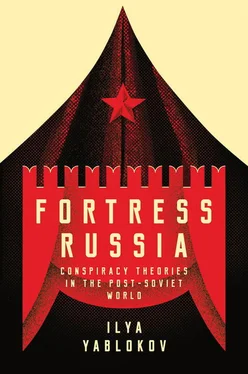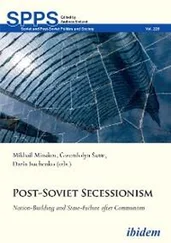1 ...6 7 8 10 11 12 ...77 This chapter seeks to contextualize the role of public intellectuals in the production and dissemination of conspiracy theories within the broader anti-Western ideological movement in Russia. Previous works have focused more on concrete personalities and movements within the anti-Western intellectual camp (Shenfield, 2001; Umland, 2007; Laruelle, 2008), saying little about the conspiracy theories deployed by these individuals. This chapter goes beyond this approach and looks specifically at the conspiracy theories these people spread. The theories put forward by selected intellectuals are analysed within the context of their political and public careers; this will allow us to draw conclusions about the interplay of conspiracy discourse and official political discourse.
Hofstadter, analysing conspiracy theorists in the USA, saw them as adherents of the ‘paranoid style’ which had limited support in society as a whole; this meant that conspiracy views played a marginal role. Fenster, however (2008, p. 39), claimed that Hofstadter had been frightened by the rise of populist demagoguery in the 1950s, which he thought disrupted the usual border between the acceptable rationale of mainstream politics and extreme populist pronouncements. As a result, his reference to the ‘paranoid style’ was a way of excluding conspiracy theorists from mainstream politics. This exclusion and public criticism of individuals who promoted conspiracy theories took place despite the high social and academic status of those involved. For that reason, conspiratorial discourse in America now takes the form of an apparently anti-intellectual critique of political elites, and conspiracy theorists often present themselves as representatives of ‘ordinary people’, as challengers of the establishment. In contrast to the USA, conspiracy theorists in post-Soviet Russia often occupy high social and academic positions, which raises the profile of their ideas. Academic credentials and proximity to power have become key facilitators of the anti-Western conspiracy discourse.
The role of public intellectuals in disseminating anti-Western conspiracy theories can be analysed through the application of Michel Foucault’s concept of the relationship between power and knowledge. In Foucault’s view, knowledge is an integral part of any struggle for power, and hence the production of knowledge can reinforce power claims (Mills, 2003, p. 69). Intellectuals perform an important function in supporting a regime’s claim to power and generating the concepts which structure society and its functions. A regime’s stability is thus achieved, at least in part, by the production by intellectuals of a discourse that helps define true and false statements; Foucault described this as ‘the regime of truth’ (Foucault, 1980, pp. 131–2). Accordingly, conspiracy theories become a type of knowledge produced by intellectuals to redistribute power between different political actors (Fenster, p. 89). Conspiracy discourses divide society into ‘Us’ and ‘Them’, thus reinforcing the claim for power by the group which is supported by their proponents.
It has been argued that Foucault’s theories, which are rooted in analyses of Western European cultures, are not readily applicable to a study of power relations in Russia because of the transitional nature of Russian culture and its position on the threshold of East and West (Plamper, 2002). Laura Engelstein (1993) has gone further and argues that Foucault’s theories cannot be applied to Russia at all because of its cultural and political backwardness in comparison to Western Europe. Although this study acknowledges the problems in applying Foucauldian methodology to this field, this branch of social history is so rich and complex that a careful selection of its elements can produce valid and insightful results (Koshar, 1993; Kotkin, 1995).
Hence, in accordance with Foucault’s theory of power/knowledge, I argue that the main concepts of the supposed Western conspiracy against post-Soviet Russia were introduced and disseminated by intellectuals from the opposition movement, which helped them to reinforce their own claims for power. However, by the 2010s many of these intellectuals had become connected to the Kremlin and had begun using their status and popularity to strengthen and support the legitimacy of the political regime and its actions.
Gleb Pavlovskii:
Conspiracy Theories as a Political Technology
In his study of post-Soviet Russian elections, Andrew Wilson (2005) devoted a chapter to the role of ‘political technologists’ in electoral politics. In his words, they ‘apply whatever “technology” they can to the construction of politics as a whole. The manipulation of the media is central to their work, but by definition it extends beyond this’ (p. 49). These political technologists have a particular interest in electoral campaigns and actively participate in all aspects of the political process. By the end of the 2000s, they had become an integral part of the Russian political landscape. Gleb Pavlovskii, a long-time adviser to the presidential administration and a pioneer of political technologies in Russia, was for two decades among the most influential intellectuals in Russian politics.
A political dissident during the Soviet period, Pavlovskii was arrested in 1982 for publishing the samizdat journal Poiski and spent five years in prison (Shargunov, 2011). Shortly after his release he opened a news agency, which later evolved into the first independent publishing house, Kommersant ; and at the beginning of the 1990s he became involved in political consulting following the opening of the Foundation of Effective Politics (Morev, 2013). From the early 1990s, for almost two decades this foundation operated as a think tank developing the Kremlin’s policies under Pavlovskii’s guidance. His skill at political manoeuvring can be seen in his initial successes: the electoral campaign of the anti-Yeltsin nationalist party, Kongress russkikh obshchin ( The Congress of Russian Communities ) in 1995 where he served as a political strategist; and then the way in which he turned around Yeltsin’s own campaign in 1996 to win a second term in office. At the start of this campaign, Yeltsin dramatically lagged behind all other major Presidential candidates and had only a 6 per cent public approval rating; but he went on to win the election with 53.8 per cent of the vote. Pavlovskii has acknowledged that this was the start of his cooperation with the presidential administration, and that this allowed him to increase his intellectual influence on the Kremlin (Shevchenko and Pavlovskii, 2012). In 2004, he was one of the advisers sent to Ukraine during the presidential elections to give support to the pro-Russian candidate Viktor Yanukovich. Yanukovich’s failure at the polls triggered a massive campaign within Russia to ensure the smooth transfer of power from Putin to his successor in 2008. Pavlovskii, as a self-proclaimed expert on ‘counter-revolutions’, became one of the key intellectuals to shape the conceptual framework of Putin’s political regime (Horvath, 2011, pp. 14–15).
Pavlovskii’s views have been formed in the 1970s under the influence of Mikhail Gefter, a revisionist Soviet historian and philosopher who studied the history of the Bolshevik revolution, Russian intellectual thought and Stalinism. Gefter was ousted from the Institute of History at the Soviet Academy of Sciences in the 1970s after his more conservative colleagues criticized his works for being ‘ideologically detrimental’ to the regime (Kurnosov, 2006). He continued to work independently and became involved in the journal Poiski, where he met Pavlovskii. The latter has acknowledged that Gefter had a crucial influence on his personal development as a political technologist: ‘Gefter picked me up and invented me (Gefter menia podobral i pridumal). I spent a lifetime in conversation with him…. All my “politics” is from Gefter’ (Morozov, 2012).
Читать дальше
Конец ознакомительного отрывка
Купить книгу












